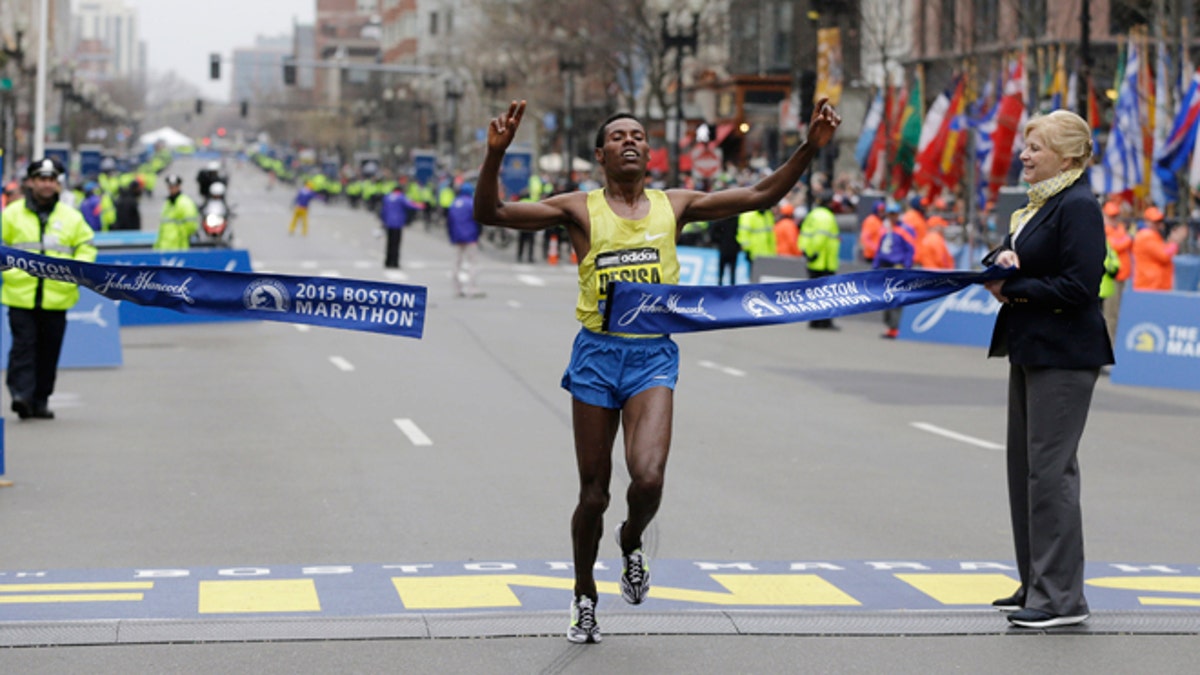
April 20, 2015: Lelisa Desisa, of Ethiopia, crosses the finish line to win the Boston Marathon in Boston. (AP Photo/Elise Amendola)
In the two years since the horrific marathon bombing, Boston has been nothing less than resilient. The city has stood defiant and proud even as it painfully relived those grim events during a trial and persevered through a winter of record blizzards. But now, spring has come again, and we remember on this Patriots’ Day that if history is any guide, it holds not only the promise of Boston’s continued steadfastness, but also an affirmation from across America that Boston does not stand alone, and never has.
Boston’s resiliency these past two years in the face of unspeakable and senseless tragedy comes as no surprise. Boston has and always will stand strong, and its resolve is a summons that America will not allow random acts of terrorism or any force to threaten the underlying fabric of our national identity.
As far back as 1775 and predating our nation’s independence, Boston stood strong against those who would do the city harm. Punished for the singular act of dumping tea into Boston Harbor and the far broader initiatives of Massachusetts toward representative government, Boston chafed under the onerous provisions of what rebels called the Intolerable Acts. Chief among them was the Boston Port Bill, which closed Boston Harbor to commerce and effectively strangled the city. The question on the minds of many—regardless of political persuasion or sympathy—went to the crux of the future: Would Boston stand alone or would a slowly evolving fabric of national identity and purpose rally to its support?
Boston’s resiliency these past two years in the face of unspeakable and senseless tragedy comes as no surprise. Boston has and always will stand strong, and its resolve is a summons that America will not allow random acts of terrorism or any force to threaten the underlying fabric of our national identity.
A wide swath of colonial America responded. Support in the form of cash, goods, livestock, and crops poured into Boston, not only from surrounding Massachusetts and New England, but also from Virginia, South Carolina, and even far-off Georgia. Samuel Adams, rebel chairman of Boston’s quasi-governmental Committee of Correspondence, was quick to dispatch effusive letters of thanks for this generosity, but Adams also used these communications to emphasize the broader ramifications of Boston’s plight: If the British crown could do this to Boston, what was to keep it from visiting similar retribution on other cities?
In Farmington, Connecticut, almost one thousand people gathered to protest blocking the port of Boston and find the resulting indignities and deprivations to Boston oppressive as well as personal. “We, and every American,” the townspeople declared, “are sharers in the insults offered to the town of Boston.”
But humanitarian aid was one thing, armed rebellion in support of political ideals quite another. The spark drawing an irrevocable line between the two came on the April morning commemorated by Patriots’ Day, when British regulars marched onto Lexington Green and confronted local militia. Before the day was out, sporadic gunfire there and at Concord’s North Bridge unleashed a fury of pent-up emotions on both sides that exploded into all-out warfare. Within weeks, Boston was a city tightly guarded by nervous British soldiers and besieged by colonial militias.
Rebel leaders who fled Boston were determined that whatever happened next, the city must not stand alone. John Hancock and the Adams cousins, Samuel and John, aggressively recruited further support from throughout the colonies. These April events could not be seen as just a local Boston incident or even a Massachusetts insurrection, but rather as an American revolution. Patriots from Connecticut to New York and from Virginia to South Carolina responded and recognized that but for the spark at Lexington and Concord, Boston’s fight might very well be occurring in their own backyards.
Two hundred and forty years ago, patriots throughout the colonies recognized that the fundamental liberties at stake in Boston went well beyond its streets and thus, the fundamental duty to fight when necessary to preserve those liberties also went well beyond Boston. For my part,” a gentleman farmer from Virginia by the name of George Washington had written a few months earlier, “I shall not undertake to say where the line between Great Britain and the colonies should be drawn, but I am clearly of opinion, that one ought to be drawn, and our rights clearly ascertained.” It is no different today. We have so much in this country that is good and just, but we must not take any of it for granted. The times remain tenuous and uncertain. We will not bend to terrorism. We will not compromise principle.
Boston’s resiliency these past two years in the face of unspeakable and senseless tragedy comes as no surprise. Boston has and always will stand strong, and its resolve is a summons that America will not allow random acts of terrorism or any force to threaten the underlying fabric of our national identity. Then as now, this city calls us to patriotism and reminds us of the strength of our nation. Merely remembering Boston is not the same as standing with Boston. This Patriots’ Day we remember that only by standing with Boston can we preserve our fundamental freedoms and affirm that Boston does not stand alone.








































